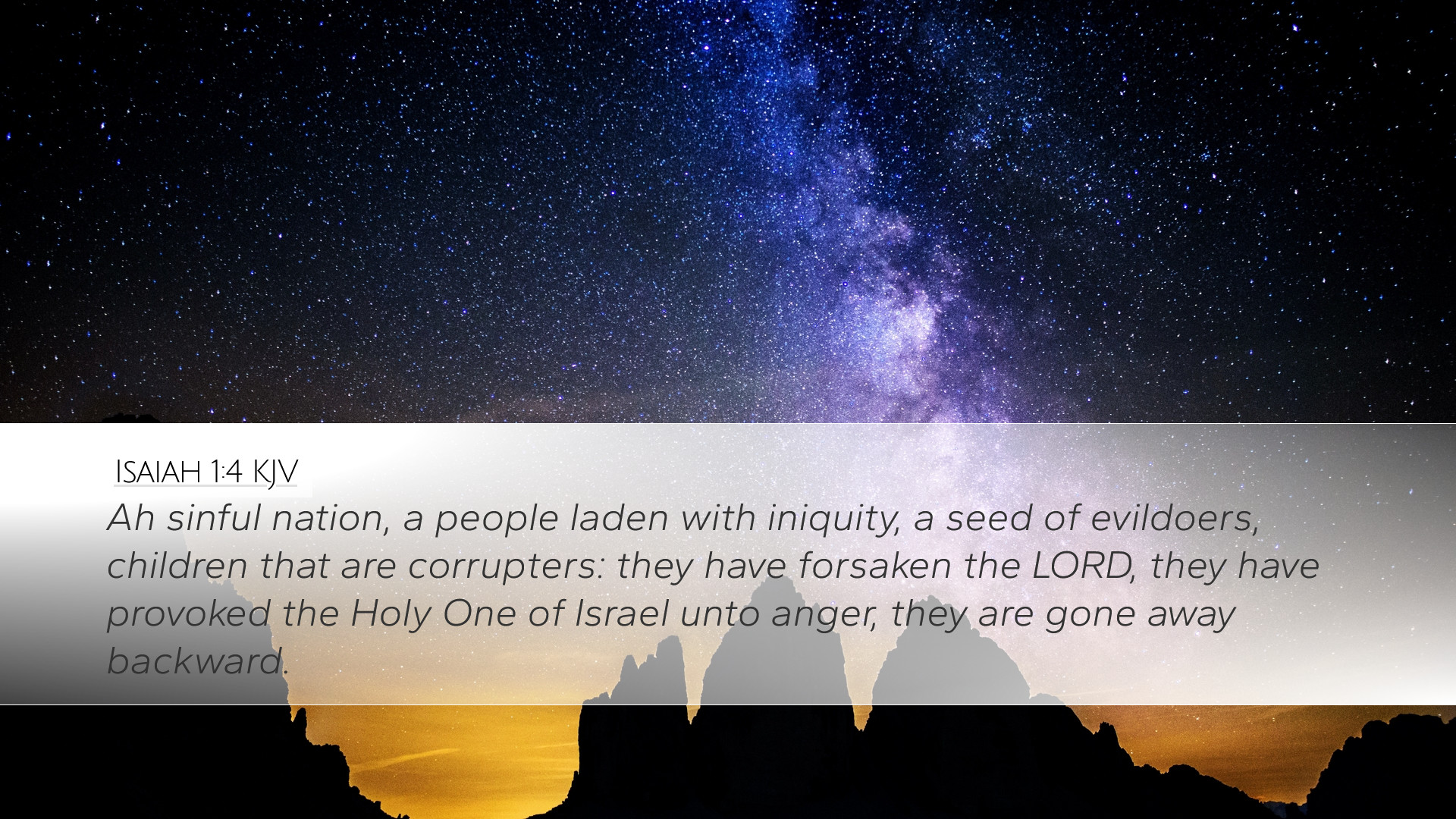Commentary on Isaiah 1:4
Verse Reference: Isaiah 1:4
Text: "Ah, sinful nation, a people laden with iniquity, a seed of evildoers, children that are corrupters: they have forsaken the LORD, they have provoked the Holy One of Israel unto anger, they are gone away backward."
Introduction
This verse serves as a solemn introduction to the prophetic revelations that Isaiah will unfold. It articulates the condition of Israel during a time of spiritual decline and estrangement from God. Both strength and burden are interwoven within the text as it highlights the consequences of turning away from divine instructions.
Contextual Background
Isaiah's ministry occurred during periods of political instability, moral decadence, and social injustice in Judah. This prophetic declaration reveals the deep-rooted sins that plagued the nation, emphasizing the gravity of their sins and their covenant relationship with Yahweh.
Exegesis of Key Phrases
-
“Ah, sinful nation”:
This exclamation captures the prophet's sorrow over the people's moral failures. The term "sinful" indicates a comprehensive condition rather than isolated acts. Henry emphasizes that this sinfulness is a national ailment that affects all strata of society.
-
“a people laden with iniquity”:
Here, the metaphor of a burden is significant. Clarke notes that iniquities weigh down the people, contributing to their spiritual lethargy. A nation “laden” suggests that their offenses extend beyond individual actions to being a collective societal downfall.
-
“a seed of evildoers”:
This phrase implies the perpetuation of evil across generations. Barnes highlights the seriousness of inherited sin, indicating a lineage characterized by wrongdoing, which is frightening as it signals a cycle that seems unbreakable.
-
“children that are corrupters”:
They are not merely passive witnesses of sin; they actively engage in corrupt practices. Henry elaborates that children of God by covenant have become rebels, showing how inversion of identity leads to moral corruption.
-
“they have forsaken the LORD”:
This forsaking represents a deliberate choice to abandon their covenant relationship. Clarke explains that this abandonment is emblematic of a heart turned away from God, suggesting spiritual desertion wrought by idolatry and disobedience.
-
“they have provoked the Holy One of Israel unto anger”:
God’s holiness is crucial in this declaration. Barnes points out that God’s reaction showcases His divine justice responding to human rebellion, thereby indicating that sin has consequences that must be addressed.
-
“they are gone away backward”:
This indicates a regression from grace; an act of moving away from God rather than toward Him. Clarke notes that "backward" signifies a willful rejection of God's path in favor of destructive ways.
Theological Implications
This verse encapsulates the tension between divine holiness and human sinfulness. The stark portrayal of Israel's obstinacy poses critical theological questions regarding human nature, free will, and the plight of a nation in rebellion. It serves as a poignant reminder of the need for repentance and restoration in the life of believers and communities.
Practical Applications
-
Self-Examination:
Pastors and leaders are encouraged to use this verse as a foundation for self-examination. Are we as a body of Christ forsaking our relationship with God? What iniquities are we laden with?
-
Holiness in Community:
The community of faith is called to reflect on its collective witness. The dangers of corruption are present if believers fail to uphold the standards of holiness defined by Scripture.
-
Call to Repentance:
Isaiah’s lament is an invitation for repentance. Each individual, as well as the corporate church, must return to the Lord, acknowledging where they have strayed and seeking restoration.
-
Understanding Divine Judgment:
This passage underscores the realities of divine judgment and anger against persistent sin. It encourages careful preaching about the seriousness of rebellion against God.
Conclusion
Isaiah 1:4 serves as a potent declaration of God’s discontent with His people. Through the insights of esteemed commentators such as Matthew Henry, Albert Barnes, and Adam Clarke, we discern the intricacies of sin, the weight of iniquity, and the resulting alienation from God. This verse urges an acute awareness among pastors, theologians, and lay believers of the seriousness of straying from divine paths. It is a call to righteousness, repentance, and a renewed commitment to God’s covenant.


